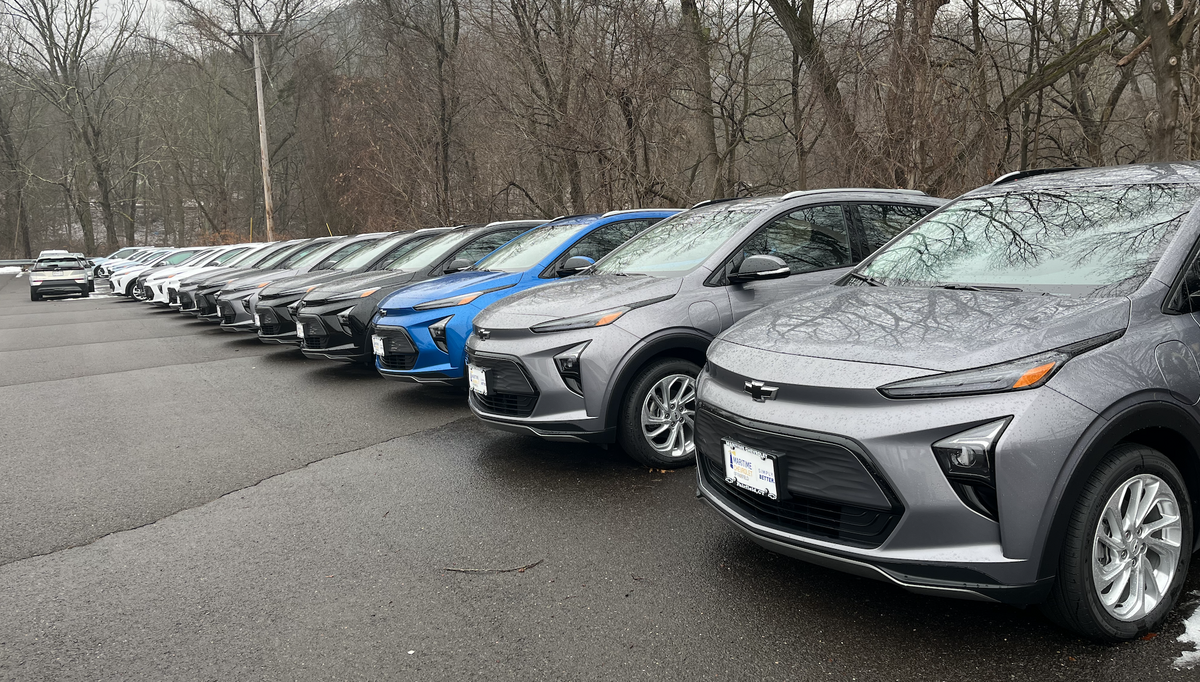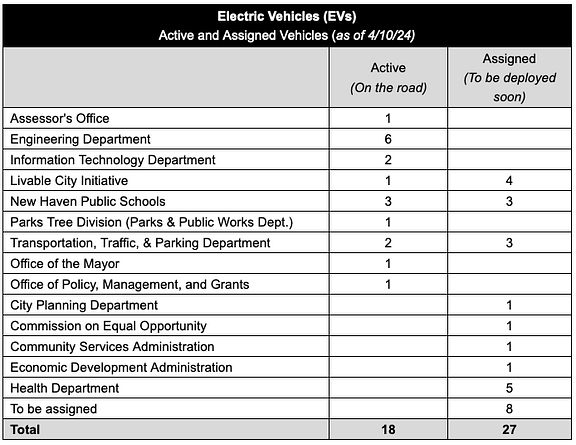
Nora Grace-Flood Photo
Yet-to-be-deployed city-owned Chevy Bolts lined up at 200 Wintergreen.
A shortage of electric car chargers has left 27 city-owned Chevy Bolts sitting unused in a parking lot — revealing how the process of electrifying public vehicles is more complicated than just buying a fleet of cleaner-energy cars.
The Elicker administration purchased 43 Chevy Bolts over the course of 2023, anticipating Chevrolet’s plans to stop producing the vehicle in 2024.
“We jumped to get the number of Bolts that we did in part because it was such a good deal,” said Steve Winter, the city’s executive director of climate and sustainability. The city took advantage of a federal incentive that reduced the cost of each vehicle from approximately $29,000 to about $21,500.
“At the time, the Bolt was the only union-made electric vehicle and it has about a 250-mile range,” Winter said. “If you compare that to a Nissan Leaf with a similar range, the MSRP [manufacturer’s suggested retail price] is $36,000 and it’s not eligible for the full incentive payment.”
In total, the city now has 45 electric vehicles, 18 of which have been deployed, according to Mayor Justin Elicker. Another 14 cars are scheduled to be put into use within the next two weeks.
So far, the city has seven electric car chargers designated for city-owned vehicles: four at City Hall and three at the Public Works headquarters. There are 17 chargers “in the pipeline,” Elicker said, including at the parking lot on State Street and Wall Street as well as at the Health Department on Chapel Street. Some of the chargers have been stalled due to supply chain-related delays, according to Elicker.
Elicker said the city is building designated chargers for city-owned vehicles rather than utilizing existing public chargers in part due to a need for precise coordination of timing each car’s charging.
Most city vehicles operate on similar schedules and may need to be charged at similar times, Elicker said. While each car can potentially last up to two weeks without being charged, he said, the city does need to plan out when and for how long each car will use a charging station.
“In the long run it’s a really exciting opportunity for the city,” Winter said, “both to reduce emissions and also produce financial savings and improve our air quality. It’s a win-win-win.”
New Haven’s efforts to build out electric vehicle infrastructure for city-owned cars reflect the broader barriers to using electric cars that members of the public may face.
“Of course not everyone has a driveway and a charger on their own property,” Elicker said. “A huge question for cities like New Haven is how do you ensure enough availability of charging” for a future of electricity-powered cars, especially when so many constituents rely on street parking.
The city received state Department of Energy and Environmental Protection funding in January to build out 24 electric car chargers, including 12 speedier “direct current” chargers by the Wilbur Cross Athletic Fields and 12 200kW on-street chargers in Wooster Square.

Lenny Speiller
City electric vehicles by department.






















Lol. Only in New Haven would one think buying discontinued e-vehicles is a good idea without the infrastructure and without the ability to have charging stations within a reasonable amount of time. It's just another stupid idea like the Homeless Hotel.